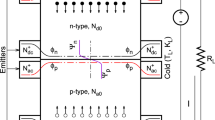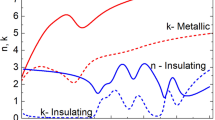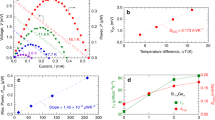Abstract
IT is well known that changes in the d.c. characteristics of transistor amplifiers with temperature are particularly severe, and tend to limit the range over which these devices can operate. The d.c. parameters, the changes of which are of interest, are the collector-emitter leakage current (Ico′), the d.c. current gain (α′) and the base-emitter input impedance, this last producing a change in the base-emitter voltage. Up to the present, stabilization has either been by minimizing these effects by suitable circuit design, or by the use of thermistors and non-linear elements in the base circuit. These have the disadvantage in some cases, of higher power consumption, and thus loss of the inherent high efficiency of the transistor amplifier, and limited range of stability.
This is a preview of subscription content, access via your institution
Access options
Subscribe to this journal
Receive 51 print issues and online access
$199.00 per year
only $3.90 per issue
Buy this article
- Purchase on Springer Link
- Instant access to full article PDF
Prices may be subject to local taxes which are calculated during checkout
Similar content being viewed by others
Author information
Authors and Affiliations
Rights and permissions
About this article
Cite this article
ZAKRZEWSKI, J., MEHRTENS, D. Use of the Silicon Resistor in the d.c. Stabilization of Transistor Circuits. Nature 184, 811–812 (1959). https://doi.org/10.1038/184811b0
Issue Date:
DOI: https://doi.org/10.1038/184811b0
Comments
By submitting a comment you agree to abide by our Terms and Community Guidelines. If you find something abusive or that does not comply with our terms or guidelines please flag it as inappropriate.



